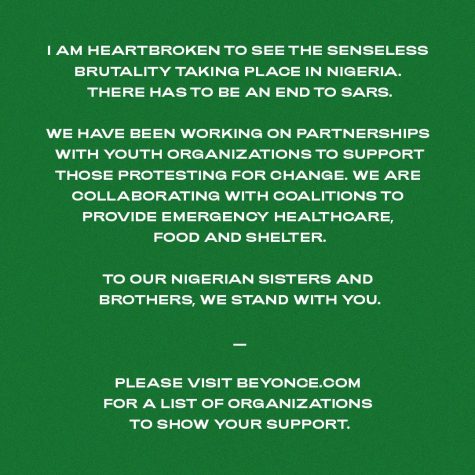Nigerian SARS Protests: Why thousands of Nigerians are demanding accountability from the police agency
Nov 30, 2020
Widespread peaceful protests against a corrupt branch of the Nigerian police force, the Special Anti-Robbery Squad (SARS), have been taking place since 2017. Thousands of Nigerians have taken part in demonstrations against this violent and brutal police force, but in recent months — beginning in late October — many of these protests have become violent. Armed soldiers fired into a crowd of these protesters, spurring on many who were already angered and concerned by the police’s use of violence against Nigerian citizens.
The SARS police force was created in the mid-eighties to combat the large number of violent crimes in Nigeria. The police force was initially successful in lowering the rate of violent crime, but the organization has not lived up to its original expectations and has become known for abusing its power.
“At least 82 cases of torture, ill-treatment, and extra-judicial execution [have been attributed to] SARS between January 2017 and May 2020,” Amnesty International said, an organization that focuses on human rights.
These actions were seen by many as constituting a disregard for the sanctity of human rights and life.
The recent October 3 killing of a man by a SARS officer has led to a wave of demonstrations opposing the organization. All around the country, thousands have joined the protests, demanding the dissolution of the SARS unit and the larger police force. Protests began mainly in the major cities of West African countries, but have developed into a global movement.

Activists on social media have taken notice of the movement, perhaps because it shares a lot in common with anti-police-violence campaigns in the United States. The hashtag #EndSARS, along with images of the protests and violence have spread not only in Nigeria but all over the world. Prominent celebrities including Beyonce, Rihanna, and many others have used their large followings to draw attention to this cause.
Along with prominent celebrities, the movement has moved as far as the United States presidential race. President-elect Joe Biden (at the time presidential candidate) spoke out on the issue.
“The United States must stand with Nigerians who are peacefully demonstrating for police reform and seeking an end to corruption in their democracy,” Biden said.
Biden urged American citizens and the government to take this issue seriously. The movement has grown greatly from Nigerian protests to a global movement opposing the violent and corrupt actions of this branch of the police force.

In response to protests, Nigerian president Muhammadu Buhari agreed to disband SARS, but the president’s decision to redeploy the officers into other parts of the Nigerian police system ensured that protests would continue. Many of the protestors see this redeployment of SARS officers as a way to smooth over the issue rather than address it, believing that they should be fired, or in more extreme cases, prosecuted.
Buhari claims that the disbanding of the SARS unit is one of the first of many steps that will be taken in holding the police system accountable to the Nigerian people. However, citizens of Nigeria clearly have their doubts.





